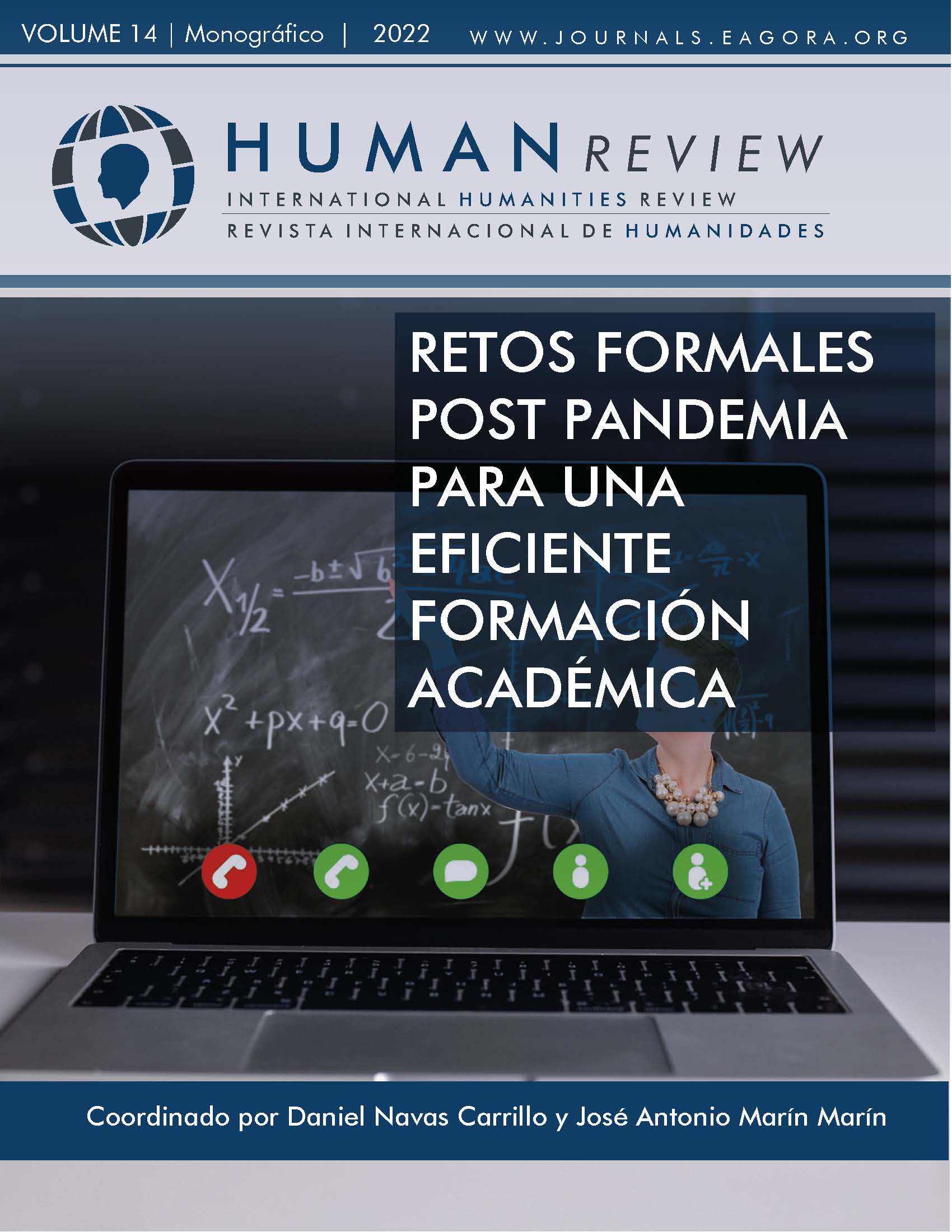Formative assessment in times of COVID-19: the perception of the university students
DOI:
https://doi.org/10.37467/revhuman.v11.4160Keywords:
COVID 19, Evaluation, Assessment test, Feedback, Assessment practicesAbstract
Within the framework of COVID-19, there was an abrupt transition from face-to-face to virtual mode in Peruvian universities. This would have triggered a series of challenges and tensions in pedagogical practices. Thus, this research analyses evaluative practices from the perspective of students (n = 194) at a university in Lima. A descriptive (quantitative) comparative and correlational (quantitative) study was chosen. The results suggest that the formative assessment of learning has experienced a clear decline, given the excessive use of tests that select answers and to the detriment of those that explore performance.
References
Afiqah, N. A., Naing, L. (2020). Is on line assessment in higher education institutions during COVID-19 pandemic reliable? Siriraj Medical Journal, 73(1), 61–68. https://doi.org/10.33192/Smj.2021.09 DOI: https://doi.org/10.33192/Smj.2021.09
Alonso, P., y Lobato, H. (2005). Elementos que influyen en el fracaso universitario: un estudio descriptivo. Revista Española de Orientación y Psicopedagogía, 15(2), 63-79. https://doi.org/10.5944/reop.vol.16.num.1.2005.11363 DOI: https://doi.org/10.5944/reop.vol.16.num.1.2005.11363
Amzalag, M., Shapira, N., Dolev, N. (2021). Two sides of the coin: Lack of academic integrity in exams during the corona pandemic, students´ and lecturers´ perceptions. Journal of Academic Ethic, 20(2), 243-263. https://doi.org/10.1007/s10805-021-09413-5 DOI: https://doi.org/10.1007/s10805-021-09413-5
Clark, C. M., y Peterson, P. L. (1986). Procesos de pensamiento de los docentes. En M. C. Wittrock (Comp.), La investigación de la enseñanza (Vol. III). Paidós.
Cárdenas, F., Luna Nemecio, y J. M. (2020). Evaluación en línea ante la pandemia por COVID-19: Retos y oportunidades para las universidades mexicanas. Universidad y Sociedad, 12(6), 393-403. https://rus.ucf.edu.cu/index.php/rus/article/view/1860 DOI: https://doi.org/10.35766/jf20231
Chirumamilla, A., Sindre, G., Nguyen-Duc, A. (2020). Cheating in E-exams and paper exams: The perceptions of engineering students and teachers in Norway. Assessment & Evaluation in Higher Education, 45(7), 940-957.https://doi.org/10.1080/02602938.2020.1719975 DOI: https://doi.org/10.1080/02602938.2020.1719975
De Vincenzi, A (2019). Del aula presencial al aula virtual universitaria en contexto de pandemia de Covid‐19. Avances de una experiencia universitaria en carreras presenciales adaptadas a la modalidad virtual. Universidad Abierta Interamericana. https://www.uai.edu.ar/docencia/orientaciones‐pedag%C3%B3gicas/
Díez Gutiérrez, E. J., y Gajardo Espinoza, K. (2020). Educar y evaluar en tiempos de Coronavirus: La situación en España. Multidisciplinary Journal of Educational Research, 10(2), 102–134. https://doi.org/10.17583/remie.2020.5604 DOI: https://doi.org/10.17583/remie.2020.5604
Elsalem, L., Al-Azzam, N., Jum’ah, A. A., y Obeidat, N. (2021). Remote E-exams during Covid-19 pandemic: A cross-sectional study of students´ preferences and academic dishonesty in faculties of medical sciences. Annals of Medicine and Surgery, 62, 326-333. https://doi.org/10.1016/j.amsu.2021.01.054 DOI: https://doi.org/10.1016/j.amsu.2021.01.054
Grande de Prado, M., García Peñalvo, F. J., Correl Almuraza, A., Abella García, V. (2020). Higher education assessment during Covid-19 pandemic. Campus Virtuales, 10(1), 49-58.
Guadalupe, C. (2015). Aprendizajes de la ECE y sus perspectivas. Tarea, 89, 9-15. https://tarea.org.pe/wp-content/uploads/2015/12/Tarea89_09_Cesar_Guadalupe.pdf
Hu, X., Santuzzi, A. M., Barber, L. K. (2019). Disconnecting to detach: The role of impaired recovery in negative consequences of workplace telepressure. Journal of Work and Organizational Psychology, 35(1) 9-15. https://doi.org/10.5093/jwop2019a2 DOI: https://doi.org/10.5093/jwop2019a2
Jauregui, R., Carrasco, L., y Montes, I. (2004). Evaluando, evaluando: ¿qué hace y qué piensa el docente en el aula. Sociedad y Economía, (54), 26 - 32. https://cies.org.pe/es/articulo/evaluando-evaluando-que-piensa-y-que-hace-el-docente-en-el-aula
Kharbat, F. F., Abu Daabes, A. S. (2021). E-proctored exams during the COVID-19 pandemic: A close understanding. Education and Information Technologies, 26(6), 6589-6605. https://doi.org/10.1007/s10639-021-10458-7 DOI: https://doi.org/10.1007/s10639-021-10458-7
León, E. (2017). El fenómeno ECE y sus efectos en las prácticas docentes. ENACCIÓN, GRADE y TAREA. http://repositorio.minedu.gob.pe/handle/MINEDU/6042
Montes, I. (1994). Propuesta de un Sistema Nacional de Evaluación del Rendimiento Escolar. Fondo de las Naciones Unidas para la Infancia UNICEF.
Montes, I. (2018a). La práctica de la evaluación formativa como proceso humano. Revista Signo Educativo, XXVII(264), 19.
Montes, I. (2018b). Las “pruebas objetivas” y su escasa relevancia para evaluar formativamente. Revista Signo Educativo, XXVII(268), 18-19.
Montes, I. (2018c). La evaluación formativa en la universidad y su injerencia en la prevención del fracaso estudiantil. Revista Experiencia Docente, 5(2), 64-71. http://experienciadocente.ecci.edu.co/index.php/experienciadoc/article/view/88/pdf
Montes, I. (2020). Evaluación Formativa: reflexiones para el debate. UDL.
Montes-Iturrizaga, I., y Franco-Chalco, E. (2021). Formative learning assessment in the context of covid 19 pandemic: a research from the perceptions of university students in Peru. 13th annual International Conference on Education and New Learning Technologies. 5th - 6th of July, 2021. https://doi.org/10.21125/edulearn.2021.1679 DOI: https://doi.org/10.21125/edulearn.2021.1679
Ortega, D., Rodríguez, J., Mateos, A. (2021). Educación superior y la COVID-19: Adaptación metodológica y evaluación online en dos universidades de Barcelona. Revista Digital de Investigación en Docencia Universitaria, 15(1), 1-13. http://dx.doi.org/10.19083/ridu.2021.1275 DOI: https://doi.org/10.19083/10.19083/ridu.2021.1275
Palomino, E. (2016). Revisando la educación en el Perú del siglo XXI: cuestionado políticas educativas y curriculares en la Educación Básica y en la educación universitaria. Palabra.
Popham, J. (1983). Evaluación basada en criterios. Magisterio Español.
Prigoff, J., Cazador, M., Nowygrod, R. (2021). Medical students´ assessment in the time of COVID-19. Journal of Surgical Education, 78(2), 370-374. https://doi.org/10.1016/j.jsurg.2020.07.040 DOI: https://doi.org/10.1016/j.jsurg.2020.07.040
Rosales, C. (1990). Evaluar es reflexionar sobre la enseñanza. Narcea.
Sala, D. (2020). Nuevos desafíos para cuestiones pedagógicas históricas. La evaluación en contexto de pandemia. Trayectorias Universitarias, 6(10), 021. https://doi.org/10.24215/24690090e021 DOI: https://doi.org/10.24215/24690090e021
Senel, S., Can Senel, H. (2021). Remote assessment in higher education during COVID-19 pandemic. International Journal of Assessment Tools in Education, 8(2), 181–199. https://doi.org/10.21449/ijate.820140 DOI: https://doi.org/10.21449/ijate.820140
Scriven, M. (1967). The methodology of evaluation. In R. Tyler, R. Gagne & M. Scriven (Eds), Perspectives on curriculum evaluation Chicago (pp. 39-83). Rand McNally.
White, A. (2020). May you live in interesting time: A reflection on academic integrity and accounting assessment during COVID-19 and online learning. Accounting Research Journal, 34(3), 304-312. https://doi-org.ezproxybib.pucp.edu.pe/10.1108/ARJ-09-2020-0317 DOI: https://doi.org/10.1108/ARJ-09-2020-0317
Downloads
Published
How to Cite
Issue
Section
License
Those authors who publish in this journal accept the following terms:
- Authors will keep the moral right of the work and they will transfer the commercial rights.
- After 1 year from publication, the work shall thereafter be open access online on our website, but will retain copyright.
- In the event that the authors wish to assign an Creative Commons (CC) license, they may request it by writing to publishing@eagora.org









